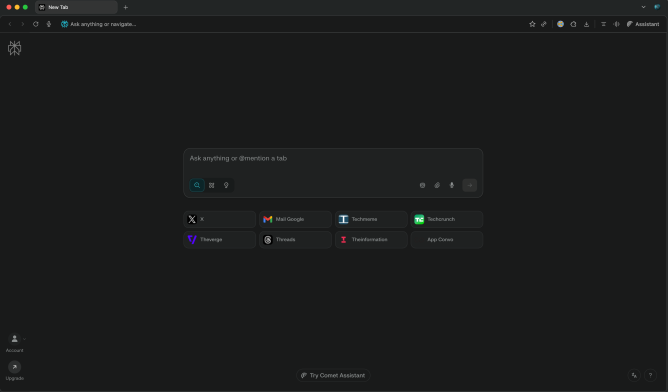Perplexity has officially rolled out its first AI-driven web browser, Comet, as part of its growing push to challenge Google Search’s dominance in the way people discover information online.
At launch, access to Comet is limited to users subscribed to Perplexity’s $200/month Max plan and a select group of invite-only testers from the waitlist.

Comet’s main feature is its deep integration with Perplexity’s AI search engine, which is built-in and set as the default. This positions the company’s flagship feature summarized, AI-generated search results right at the core of the browsing experience.
Alongside this, Comet introduces a new tool called Comet Assistant. This in-browser AI assistant is designed to handle everyday digital tasks like summarizing emails and calendar entries, managing tabs, and navigating web pages. It operates through a side panel that can interpret whatever is on-screen and respond to questions based on that context.
While Perplexity has launched multiple tools recently, Comet stands out as a major strategic move. CEO Aravind Srinivas has been vocal about the significance of this launch, suggesting it could be a game-changer in the company’s effort to directly challenge Google. By creating its own browser, Perplexity hopes to bypass Chrome entirely and build a direct relationship with users.
Srinivas has described Comet as the beginning of a broader “operating system” where Perplexity’s AI can assist across all apps and websites. He sees the browser as a pathway to long-term user engagement, calling it a strategy for “infinite retention.” With over 780 million queries logged in May 2025 and over 20% monthly growth, the company is betting big on Comet to extend its momentum.
Still, getting users to adopt a new browser may be harder than getting them to try a new search engine. Browsers are deeply integrated into user habits, and most are hesitant to switch.
Testing Comet in Action
The standout feature during hands-on use is the Comet Assistant. For simple, routine tasks, it performs well. When docked to the side of any webpage, it automatically sees what you're viewing and can answer questions or provide suggestions without needing to open a new tab or copy content. It worked across platforms, including social media, YouTube, and even live Google Docs, creating a more efficient workflow.
For example, it was able to summarize emails from tech companies in my inbox and notify me of upcoming calendar events. It even suggested travel times and directions based on my schedule.
However, more advanced tasks reveal its limitations. When I asked it to find and book affordable long-term airport parking in San Francisco, it started off well but quickly stumbled. The assistant hallucinated wrong dates and still urged me to check out, despite the errors. Even after I clarified the correct dates, it repeated the same mistake with a different location.
These issues are not new. Similar experiences with other AI agents, like OpenAI's Operator, have shown the same flaws. Until these hallucination problems are resolved, AI agents will struggle to become truly reliable tools for anything beyond surface-level tasks.
That said, Comet introduces fresh ideas in the browser space. If Perplexity continues refining the assistant and fixing its reliability issues, Comet could become a serious contender in the evolving world of AI-enhanced browsers.
